|
|
|
Sort Order |
|
|
|
Items / Page
|
|
|
|
|
|
|
| Srl | Item |
| 1 |
ID:
083594
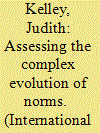

|
|
|
|
|
| Publication |
2008.
|
| Summary/Abstract |
Given that states have long considered elections a purely domestic matter, the dramatic growth of international election monitoring in the 1990s was remarkable. Why did states allow international organizations and nongovernmental organizations (NGOs) to interfere and why did international election monitoring spread so quickly? Why did election monitoring become institutionalized in so many organizations? Perhaps most puzzling, why do countries invite monitors and nevertheless cheat? This article develops a rigorous method for investigating the causal mechanisms underlying the rise of election monitoring, and "norm cascades" more generally. The evolution and spread of norms, as with many other social processes, are complex combinations of normative, instrumental, and other constraints and causes of action. The rise of election monitoring has been driven by an interaction of instrumentalism, emergent norms, and fundamental power shifts in the international system. By dissecting this larger theoretical complexity into specific subclaims that can be empirically investigated, this article examines the role of each of these causal factors, their mutual tensions, and their interactive contributions to the evolution of election monitoring
|
|
|
|
|
|
|
|
|
|
|
|
|
|
|
|
| 2 |
ID:
152738
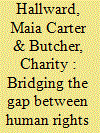

|
|
|
|
|
| Summary/Abstract |
While the concepts of human rights and peace are increasingly linked in the study and practice of International Relations, there is great variance and inconsistency in how the concept of peace is discussed in the study and practice of human rights. We conduct an examination of the websites of human rights nongovernmental organizations (NGOs) affiliated with the United Nations Human Rights Council in Geneva, Switzerland, to explore whether and how human rights and peace are linked. Religiously-affiliated and women’s NGOs typically link these concepts, while non-Western NGOs stress peace over human rights.
|
|
|
|
|
|
|
|
|
|
|
|
|
|
|
|
| 3 |
ID:
165595
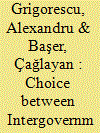

|
|
|
|
|
| Summary/Abstract |
This article seeks to explain when governments are more likely to take an intergovernmental approach to resolving global collective problems rather than step back and encourage (or simply allow) nongovernmental actors to become the main global governors. The authors suggest that an important factor driving this choice is the domestic ideological leanings of powerful states toward greater or lesser government activism. Such ideologies connect domestic preferences to international ones. They also lead to the establishment of domestic institutions that, in turn, facilitate the emergence of international organizations. Using these arguments, the authors develop a set of inferences regarding the likelihood that governments will establish and join intergovernmental organizations. The authors test their hypotheses through a study of global governance in the education realm, and also apply a series of statistical analyses covering developments in all issue-areas over the last century and a half.
|
|
|
|
|
|
|
|
|
|
|
|
|
|
|
|
| 4 |
ID:
052473
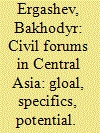

|
|
|
| 5 |
ID:
108842
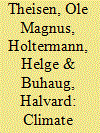

|
|
|
|
|
| Publication |
2011-12.
|
| Summary/Abstract |
Dominant climate models suggest that large parts of Africa will experience greater climatic variability and increasing rates of drought in coming decades. This could have severe societal consequences, because the economies and food supplies of most African countries depend on rain-fed agriculture. According to leading environmental security scholars, policymakers, and nongovernmental organizations, an increase in scarcity-driven armed conflicts should also be expected. A conditional theory of environmental conflict predicts that drought increases the risk of civil war primarily when it strikes vulnerable and politically marginalized populations in agrarian societies. However, an empirical evaluation of this general proposition through a unique gridded dataset of postcolonial Africa, which combines high-resolution meteorological data with georeferenced data on civil war onset and the local ethnopolitical context, shows little evidence of a drought-conflict connection. Instead, the local risk of civil war can be explained by sociopolitical and geographic factors: a politically marginalized population, high infant mortality, proximity to international borders, and high local population density.
|
|
|
|
|
|
|
|
|
|
|
|
|
|
|
|
| 6 |
ID:
019921
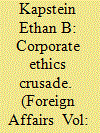

|
|
|
|
|
| Publication |
Sept/Oct 2001.
|
| Description |
105-119
|
|
|
|
|
|
|
|
|
|
|
|
|
|
|
|
| 7 |
ID:
108495
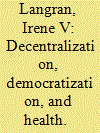

|
|
|
|
|
| Publication |
2011.
|
| Summary/Abstract |
In 1991, the Philippines joined a growing list of countries that reformed health planning through decentralization. Reformers viewed decentralization as a tool that would solve multiple problems, leading to more meaningful democracy and more effective health planning. Today, nearly two decades after the passage of decentralization legislation, questions about the effectiveness of the reforms persist. Inadequate financing, inequity, and a lack of meaningful participation remain challenges, in many ways mirroring broader weaknesses of Philippine democracy. These concerns pose questions regarding the nature of contemporary decentralization, democratization, and health planning and whether these three strategies are indeed mutually enforcing.
|
|
|
|
|
|
|
|
|
|
|
|
|
|
|
|
| 8 |
ID:
071712
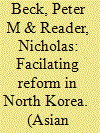

|
|
|
|
|
| Publication |
2005.
|
| Summary/Abstract |
Despite the continuing nuclear confrontation between North Korea and the world, the North is undergoing the most profound economic changes since the founding of the state. The international community can improve North Korea's chances of making a successful transition by first taking advantage of the new opportunities to train North Koreans in financial, technical, and market economic skills. Additionally, the international community can address infrastructural constraints, and undertake comprehensive needs assessments. North Korea will not and should not receive significant international development assistance until it gives up its nuclear weapons, but increasing knowledge about the economy will improve the prospect that any deal reached on the nuclear issue will lead to transformation of the economy.
|
|
|
|
|
|
|
|
|
|
|
|
|
|
|
|
| 9 |
ID:
108964
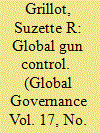

|
|
|
|
|
| Publication |
2011.
|
| Summary/Abstract |
The global spread and misuse of small arms is one of the most alarming and growing security issues of the post-Cold War era. For many reasons, however, controlling the spread of small arms is extremely difficult. Nonetheless, given the serious nature of the small arms issue, numerous states, nongovernmental organizations, and individual activists have sought to address various small arms problems. One of the earliest suggestions that analysts and advocates offered was to develop international norms and standards of behavior that outline the parameters of acceptable small arms activities. Despite the numerous actions that states and NGOs have taken over the past ten years in an effort to combat these problems, corresponding norms are relatively weak or nonexistent. This article seeks to answer why this is the case. It examines why global small arms control norms are largely weak or nonexistent and explains why the prospects for stronger norms are few. Although research on norms in international relations is swelling with studies showing whether, how, and why norms emerge and affect state behavior, few studies focus on cases where norms actually do not emerge or influence action. The primary explanation for weak small arms norms is a competitive normative environment that is facilitated and perpetuated by: (1) competing coalitions that promote opposing norms and ideas and (2) a great-power consensus that works against stronger arms control norms.
|
|
|
|
|
|
|
|
|
|
|
|
|
|
|
|
| 10 |
ID:
083824
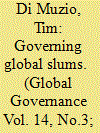

|
|
|
|
|
| Publication |
2008.
|
| Summary/Abstract |
Recent literature has focused on the ways in which civil society organizations are contributing to practices of global governance in an era of neoliberalism. As UN Habitat has pointed out, what has also coincided with the shift to neoliberalism is the proliferation and growth of global slums. As slums have become an increasingly widespread form of human settlement, a global campaign to improve the life of slum dwellers has emerged under the Millennium Development Goals. In this article, I argue that this project can be conceived of as a biopolitical campaign where nongovernmental and community-based organizations are viewed as a kind of panacea for the problem of slums. This view is misguided given the scale of the problem and the apartheid of life chances that has accompanied neoliberalism.
|
|
|
|
|
|
|
|
|
|
|
|
|
|
|
|
| 11 |
ID:
165316
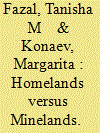

|
|
|
|
|
| Summary/Abstract |
Why do some armed groups commit to abide by the laws of war governing belligerent conduct during armed conflict, while others do not? We examine why only half the armed groups approached by the nongovernmental organization Geneva Call have signed a public Deed of Commitment banning the use of antipersonnel land mines. In contrast to recent studies that have tended to focus on the legitimacy concerns of armed groups, we argue that political objectives combine with military utility calculations to shape the behavior of armed groups in the realm of international humanitarian law. Utilizing original data on the ninety armed groups engaged by Geneva Call since 2000, we find that strong secessionist groups are most likely to sign the Deed of Commitment. Our findings have important implications for theories of international law, the study of civil wars, and on the ground efforts to mitigate the human costs of war.
|
|
|
|
|
|
|
|
|
|
|
|
|
|
|
|
| 12 |
ID:
184650
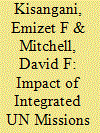

|
|
|
|
|
| Summary/Abstract |
Since the end of the Cold War, the UN has extended many of its missions in conflict zones to include political, military, and humanitarian activities. Many humanitarian nongovernmental organizations have been critical of these “integrated” UN missions, claiming that they can blur the distinction between political, military, and humanitarian action, thus placing humanitarian aid workers at risk of retaliation from warring factions opposed to the UN’s political objectives. This proposition is empirically tested using generalized methods of moments statistical analysis of sixty-seven countries that experienced intrastate conflict between 1997 and 2018. When assessing attacks in general—to include the sum of aid workers killed, wounded, and kidnapped—the results indicate that humanitarian aid workers are more likely to come under attack in countries that have an integrated UN mission. However, when the attacks are assessed separately, results show that this relationship holds only with aid workers who are killed in the field.
|
|
|
|
|
|
|
|
|
|
|
|
|
|
|
|
| 13 |
ID:
145404
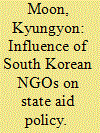

|
|
|
|
|
| Summary/Abstract |
I examine the experiences of South Korean nongovernmental organizations (NGOs) that provide aid to North Korea in order to assess the success and limitations of the NGO movement. With reference to the political role of NGOs in constructivist theory, I identify three factors that have hindered the formation of a sustainable partnership between the South Korean government and NGOs since the inter-Korean summit of 2000. First, South Korean NGOs have lacked consistent efforts toward transparency and accountability in operations and organizational management. Second, the great increase in inter-Korean cooperation and exchange after 2000 weakened the research, education, and advocacy function of NGOs. Third, aid NGOs failed to establish independent, diversified, and stable funding mechanisms, decreasing their capacity to act as cooperative partners of the government.
|
|
|
|
|
|
|
|
|
|
|
|
|
|
|
|
| 14 |
ID:
080978
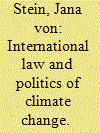

|
|
|
|
|
| Publication |
2008.
|
| Summary/Abstract |
A considerable challenge for the creators of international environmental agreements is how to design mechanisms that deter defection without deterring participation. Relatively ``soft'' law often garners widespread participation, but it creates few concrete incentives for states to improve behavior. ``Harder'' commitments make shirking more difficult, but these institutional features may deter from joining the very states whose practices are least consistent with the treaty's requirements. Empirical analyses of ratification of the core agreements of the climate change regime support these propositions. Flexibility provisions provide one mechanism for states to mitigate this dilemma. The findings with regard to one flexibility mechanism strongly support this argument. The results with regard to a second flexibility mechanism, however, tend to follow an opposite pattern. The author offers a preliminary interpretation of this finding. Finally, this article provides insight into how international social networks and the strength of domestic nongovernmental organizations affect ratification
|
|
|
|
|
|
|
|
|
|
|
|
|
|
|
|
| 15 |
ID:
156235
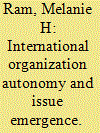

|
|
|
|
|
| Summary/Abstract |
How do international organizations (IOs) decide to address new issues? Most IO literature focuses on why states delegate to IOs and if, when, and how IOs are able to act autonomously. Less attention is paid to how IOs may use their autonomy to bring attention to new issues. This article theorizes about IO issue emergence using a qualitative case study of the advent of the World Bank's Roma inclusion agenda. By examining a case of issue emergence that appears to diverge from state demands, we can better understand how IOs exercise their autonomy and consequently shape global policy agendas.
|
|
|
|
|
|
|
|
|
|
|
|
|
|
|
|
| 16 |
ID:
122304
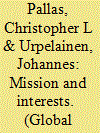

|
|
|
|
|
| Publication |
2013.
|
| Summary/Abstract |
International advocacy campaigns allow the concerns of disadvantaged groups in developing countries to reach policymakers. However, recent research has challenged the motivations of the Northern nongovernmental organizations involved and raised concerns about the impacts of North-South NGO partnerships on Southern NGO control. This article addresses these concerns by developing a typology of NGOs based on their financial incentives and the rigidity with which they adhere to their established organizational mission. It then models interactions between NGOs of different types as a strategic game. In the game, NGOs decide whether to enter international campaigns and, if so, manage campaign function to maximize payoff. "Participation-oriented" Northern NGOs, whose supporters reward them for undertaking advocacy, were found to run lengthy but ineffective campaigns and focus on publicity. "Outcome-oriented" groups, whose supporters reward them for measurable achievement, were found to generate higher campaign intensity but exit after either early victories or costly difficulties. The model is illustrated with a comparative analysis of two different campaigns regarding the Narmada Dam project.
|
|
|
|
|
|
|
|
|
|
|
|
|
|
|
|
| 17 |
ID:
008042
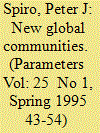

|
|
|
|
|
| Publication |
1995.
|
| Description |
43-54
|
|
|
|
|
|
|
|
|
|
|
|
|
|
|
|
| 18 |
ID:
121817
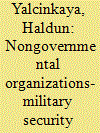

|
|
|
|
|
| Publication |
2013.
|
| Summary/Abstract |
The question this article addresses is how and to what extent international military forces can support nongovernmental organizations (NGOs) in armed conflicts and postconflict arenas. As non-state actors, NGOs have serious security problems and their current protection is not sufficient to secure humanitarian operations. The Afghanistan NGO Safety Office (ANSO) was established in 2002 to solve this problem. The ANSO innovation resulted in a new NGO-military security collaboration mechanism. In particular, the article examines whether the NGO-military security collaboration mechanism established between NATO International Security Assistance Force, the United Nations Assistance Mission in Afghanistan, and the ANSO could be a fourth way in narrowing NGOs' security gap in addition to the existing three ways (judicial, theoretical, and practical). I would argue international military forces need to take into account ANSO model organizations for fulfilling their responsibility to secure NGOs in armed conflicts and postconflict arenas.
|
|
|
|
|
|
|
|
|
|
|
|
|
|
|
|
| 19 |
ID:
117979
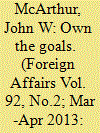

|
|
|
|
|
| Publication |
2013.
|
| Summary/Abstract |
Since their inception in 2000, The Millennium Development Goals have revolutionized the global aid business, using specific targets to help mobilize and guide development efforts. They have encouraged world leaders to tackle multiple dimensions of poverty simultaneously and provided a standard for judging performance. As their 2015 expiration looms, the time has come to bank those successes and focus on what comes next.
|
|
|
|
|
|
|
|
|
|
|
|
|
|
|
|
| 20 |
ID:
083434
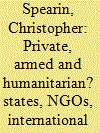

|
|
|
|
|
| Publication |
2008.
|
| Summary/Abstract |
The article contends that, in the light of contemporary challenges, states are not only changing the meaning of the word `humanitarian', but are also creating an expanding marketplace that includes international private security companies (PSCs) in the delivery of humanitarian assistance. Three types of factors - supply, demand, and ideational - have led to this development. On the supply side, state-demanded limitations on the private employment of violence and reduced commercial opportunities in Iraq have called for PSC diversification. On the demand side, states increasingly wish for non-state partners that are comfortable with their involvement in integrated solutions, something that PSCs, rather than nongovernmental organizations (NGOs), are more willing to embrace. On the ideational side, NGOs are concerned that humanitarian endeavour is losing its neutral and impartial status in order to facilitate counterinsurgency, `hearts and minds' activities. PSCs, in contrast, are content with the partial delivery of assistance and likely will continue to be so given, in large part, the experiences of their personnel.
|
|
|
|
|
|
|
|
|
|
|
|
|
|
|
|
|
|
|
|
|